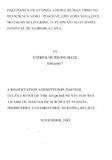| dc.description.abstract | Globally,Human Immunodeficiency Virus (HIV) is a major cause of morbidity and
mortality among women and children. As of 2011, approximately 34 million people had
HIV worldwide. Of these, approximately 17.2 million were women and 3.4 million were
less than 15 years old. The purpose of this study was to compare pregnancy outcomes in
Human-immuno Deficiency Virus (HIV) zero-positive and negative mothers delivering at
Pumwani Maternity Hospital. The hospital is located in Pumwani Division in Nairobi
County and has a bed capacity of 350 and 150 cots, with an average of 60 deliveries per
day. The objective of the study was to describe the pregnancy outcome among HIV zero-positive
and negative mothers delivering in Pumwani Maternity Hospital, antenatal clinic
attendance,gestation of the pregnancy at delivery, hemoglobin level, mode of delivery,
body weight, and total blood loss following delivery.and determine the birth weight and
apgar score of their babies.The methodology for the study was an analytical study design.
Delivered consenting mothers satisfying inclusion criteria were interviewed by trained
research assistants. Data collection tool was a researcher administered questionnaire that
measured the independent, dependent and outcome variables of the study, namely;
neonatal outcomes such as birth weight andapgar score; while maternal
outcomes included antenatal clinic attendance,gestation of pregnancy at delivery, total
blood loss, weight and mode of delivery.The data was entered in SPSS computer package
version 10 and later analyzed and interpreted using inferential and descriptive statistics.
Ethical approval for the study was sought from Kenyatta National Hospital
(KNH)!University of Nairobi Ethics and Research Committee and the Medical
Superintendent of Pumwani Maternity Hospital.93 mothers were recruited for study. 20
were HIV zero-positive and 73 were negative. A pregnancy outcome was independently
associated with HIV infection. Antenatal clinic attendance(OR=1 ; P= 0.99), gestation of
pregnancy at delivery(OR=0.6; P=0.46), mode of delivery(OR= 2.8; P=0.05), total blood
loss(OR=2.7;P=0.04), body mass index(chi=3.03;P=0.22), apgar score(OR=0.2; P=0.19),
and birth-weight(OR=0.2, P=0.04). Results of the study revealed no significant
differences in antenatal clinic attendance, gestation of pregnancy at delivery, body mass
index, apgar score and birth-weight among the HIV zero-positive and negative group.
There was significant difference in the total blood loss among the zero-positive and
negative group. The study established that there is no relationship between HIV serestatus
and body mass index of a mother; nor between HIV zero-status of the mother
and a pgar score and birth-weight of the baby. From the study results, it can be concluded
that HIV zero-positive women are at a significantly higher risk of bleeding during
delivery than the zero-negative mothers. The quality of antenatal care is a major
determinant of pregnancy outcome for both the mother and her baby.The results of the
study will be shared with peers, the hospital management and staff working in the study
setting. The information generated will be important for programs designed to care for
pregnant women, as well as inform the development of clinical practice guidelines. | en_US |
| dc.description.department | a
Department of Psychiatry, University of Nairobi, ; bDepartment of Mental Health, School of Medicine,
Moi University, Eldoret, Kenya | |

